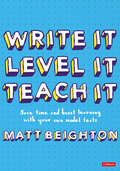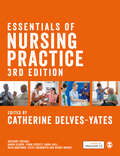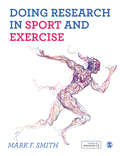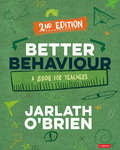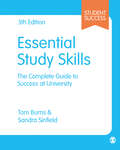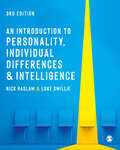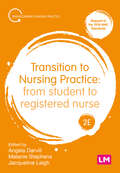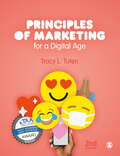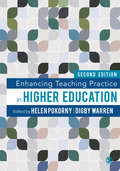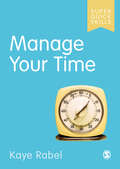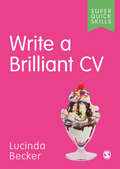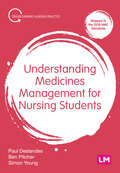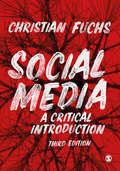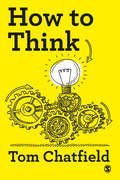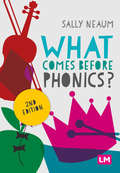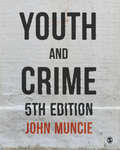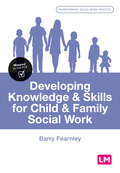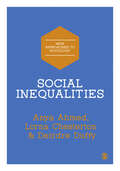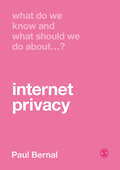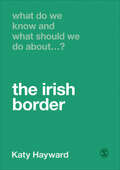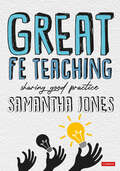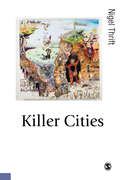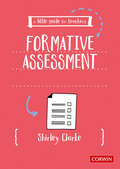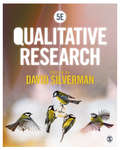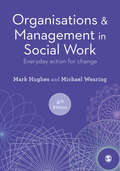- Table View
- List View
Write It Level It Teach It: Save time and boost learning with your own model texts
by Matt BeightonStop spending hours searching for, adapting and improving model texts for use in your classroom teaching. There is a way to save time and get properly levelled and relevant texts for your teaching – write your own. In Write It. Level It. Teach It., Matt Beighton shows you how and why writing your own model texts for teaching is so much better. Based on his experiences as a classroom teacher and having written nearly 1,000 comprehension texts for the Literacy Shed, Matt demonstrates how to do this quickly and effectively. * Includes writing templates for busy teachers. * Explores why correctly levelled texts matter. * Boosts learning and engagement. * Saves time and effort through collecting and re-using texts.
Essentials of Nursing Practice
by Catherine Delves-YatesDelivering knowledge, theory and skills for the NMC Future Nurse curriculum. This definitive textbook introduces the core topics and essential information that every nursing student will need to master during their degree. Written by a diverse team of nursing educators from around the UK, with input from patients, practitioners and students, the book delivers a complete solution that challenges modern nursing practice and prepares students for the changing health needs of communities and individuals. Key features: Adopts a values-based and person-centred approach to nursing Modelled on the NMC Standards providing full coverage of the core curriculum Real-life ‘voices’ and experiences from patients, students and practitioners bring the subject to life Includes active learning features that develop graduate nursing skills such as critical thinking, reflection and evidence-based practice Lecturers and educators can also access a collection of exclusive teaching materials including presentation slides for each chapter, hundreds of multiple choice and short-form questions, guided case studies as well as recommendations for video-based activities with assignable questions.
Doing Research in Sport and Exercise: A Student′s Guide
by Mark SmithSplit into five sections that cover your whole research journey, this book captures everything you need to understand to do a sports research project. From getting started with a research question and selecting a research approach to choosing a method of data collection and analysing and presenting research findings, it walks you step-by-step through the entire research process. The book also: Showcases a diverse range of approaches, including experiments, surveys, focus groups, interviews, systematic reviews and mixed methods, to help you choose the best option for your project. Focuses on applied research, showing you how to go beyond the classroom, conduct research in the field and manage and analyse data in the real world. Explores how your supervisor can support you to get the most out of your project. Features include over 40 student activities that encourage you to think more deeply about what you′ve learned, nearly 50 case studies highlighting research from real-world students and sport researchers, and reflection points, to help you check your understanding. For students across courses relating to Sport & Exercise Science, Coaching Practice & Development, PE and Sport, this book is a down-to-earth guide to help anyone doing a research project in sport and exercise.
Better Behaviour: A Guide for Teachers (Corwin Ltd)
by Jarlath O′BrienWhat does it take to improve the behaviour of the children you teach? This second edition of Jarlath O’Brien’s insightful, practical guide for teachers, and those training to teach, combines psychological research, authentic classroom experience and the lessons learned from improving behaviour in schools. You will be challenged to think about your own practice, question accepted orthodoxies and to develop an empowered and confident approach to improve the behaviour of the children you teach. This new edition includes: · A new chapter on how to work with a class where behaviour isn’t good enough · New, expanded discussion of bullying · A new ‘How would you deal with this situation?’ feature exploring tricky scenarios · A new interview feature offering useful perspectives from early career teachers · A new further reading feature so you can explore selected topics in more depth
Essential Study Skills: The Complete Guide to Success at University (Student Success)
by Tom Burns Sandra Sinfield"If you′re looking to be that top student, this book is a must!" – five-star student review Packed with study tips, activities, templates and quotes from students, this is your essential guide to university, showing you step-by-step how to study effectively and make the best of your time at university. Whether you are going to university straight from school, as a mature, or as an overseas student studying in the UK for the first time, you′ll find out how to: Sail through those tricky first weeks Get the most out of lectures by understanding how you learn Learn techniques for academic writing and research Effectively work with others in groups, seminars and workshops Write assignments and pass exams with flying colours Build your CV and plan your next steps after graduation. New to this edition is content on how to thrive at university, learn and research digitally, and how to develop your employability skills. Student Success is a series of essential guides for students of all levels. From how to think critically and write great essays to boosting your employability and managing your wellbeing, the Student Success series helps you study smarter and get the best from your time at university.
An Introduction to Personality, Individual Differences and Intelligence (SAGE Foundations of Psychology series)
by Nick Haslam Luke SmillieWhat does it mean to have a personality? Is emotional intelligence a kind of intelligence? Learn the answers to these questions, as well as everything you need to know about personality, intelligence, and individual differences in the third edition of this clear and accessible textbook. From natural selection to intelligence tests, and from personality disorders to the concept of IQ, the panoramic coverage of this field makes this textbook essential reading for any psychology student on a personality and individual differences course. New to this edition: · Increased coverage of intelligence · ‘Key Theorists’ feature · Discussion questions moved to end-of-chapter to enable in-text assessment Nick Haslam is Professor of Psychology at the University of Melbourne, Australia. Luke Smillie is an Associate Professor of Psychology at the University of Melbourne and director of the Personality Processes Lab.
Transition to Nursing Practice: From Student to Registered Nurse (Transforming Nursing Practice Series)
by Angela Darvill Melanie Stephens Jacqueline LeighThe transition from student to newly registered nurse can be daunting but with the right preparation, you can step into your new role with confidence. This book provides valuable guidance on what to expect, practical strategies for easing the transition and advice for supporting your ongoing personal and professional development. Key features o Each chapter is mapped to the new 2018 NMC standards o A new chapter on contemporary trends in nursing covers digital skills, peer facilitation, integrated working and more o Self-assessment tools and reflective activities help you to examine your competencies and identify goals for your development o A chapter on health and wellbeing illustrates the importance of self-care and recommends strategies to reduce stress and build resilience
Principles of Marketing for a Digital Age
by Tracy L. TutenWinner of the TAA 2021 Most Promising New Textbook award! This award-winning textbook introduces you to all the essential concepts and tools for marketing in a digital age. The new second edition retains a strong focus on digital and social media marketing, and has been updated to include cutting-edge coverage on the implications of Covid-19 on consumer behavior. Greater emphasis has been placed on sustainability, diversity and inclusion, providing you with the skills you will need to become an ethical and socially-minded marketer. The new edition also includes: • Over 30 case studies from global companies, including Netflix, Amazon, Zara, Tony’s Chocolonely, Nissan, and Airbnb • A revamped ‘Sustainability Spotlight’ feature in every chapter that aligns with the UN’s Principles for Responsible Management Education (PRME) initiative • A wide range of critical thinking questions that encourage you to reflect on real-world examples and scenarios. This textbook is your essential guide to marketing as part of an introductory marketing course at college or university. Principles of Management for a Digital Age is accompanied by online resources for instructors, including PowerPoints, a testbank, selected content from SAGE Business Cases and a teaching guide containing lecture objectives, chapter outlines, activities and discussion questions. Students can access additional video content and further reading for each chapter. Tracy L. Tuten is a professor of marketing at Sofia University, USA.
Enhancing Teaching Practice in Higher Education
by Tom Burns Sandra Sinfield Steven Cranfield Helen Pokorny Digby Warren Ben Goldsmith Dave Griffiths Sarah Flynn Debbie Holley David Fevyer Kathy Harrington Susannah McKee Matt Scandrett Julian Ingle Sibyl Coldham Pauline Armsby Johanna Payton Jennifer Bright Rebecca EliahooThis book integrates a wide body of theory and pedagogical research to enrich and empower teaching in universities, with a focus on transformational practice and education for social justice. In this fully updated second edition, you will be provided with ideas and practical strategies drawn from literature and real-life experience across a range of academic disciplines. This second edition includes: · Two new chapters on: inspiring learning through technologies, and holistic and creative pedagogies · Approaches to decolonising the curriculum and working with student diversity and partnership · Innovations in learning environments including responses to the pandemic, university writing and developing learning through, and for, work · A new feature: case studies in every chapter to illustrate theoretical ideas across disciplines
Manage Your Time (Super Quick Skills)
by Kaye RabelEffective time management is essential at university. This handy guide gives you simple, practical and achievable advice on how to better utilise your time and successfully meet deadlines. Identify ways in which you mismanage your time Effectively plan both group and individual tasks and assignments Successfully balance academic and other life priorities. Super Quick Skills provides the essential building blocks you need to succeed at university - fast. Packed with practical, positive advice on core academic and life skills, you’ll discover focused tips and strategies to use straight away. Whether it’s writing great essays, understanding referencing or managing your wellbeing, find out how to build good habits and progress your skills throughout your studies. Learn core skills quickly Apply them right away and see results Succeed in your studies and in life Super Quick Skills gives you the foundations you need to confidently navigate the ups and downs of university life.
Write a Brilliant CV (Super Quick Skills)
by Lucinda BeckerHaving a good CV is integral for securing your perfect job. This book gives you the tools necessary to produce a persuasive CV, targeted at the relevant career and accurately reflecting your value to a potential employer. Learn how to target your CV Showcase your key skills and experience Prove your value so you′re hired on the spot. Super Quick Skills provides the essential building blocks you need to succeed at university - fast. Packed with practical, positive advice on core academic and life skills, you’ll discover focused tips and strategies to use straight away. Whether it’s writing great essays, understanding referencing or managing your wellbeing, find out how to build good habits and progress your skills throughout your studies. Learn core skills quickly Apply them right away and see results Succeed in your studies and in life Super Quick Skills gives you the foundations you need to confidently navigate the ups and downs of university life.
Understanding Medicines Management for Nursing Students (Transforming Nursing Practice Series)
by Simon Young Ben Pitcher Paul DeslandesUnderstanding medicines management is central to the nursing role. As a nurse, you will need to make informed decisions about medicine use and optimisation, tailored to each patient. This book equips you with the theoretical and practical foundation to do just that. It covers all key components of medicines management, using a scenario-based approach to illustrate how each topic relates to your practice. Key features · Fully mapped to the NMC standards of proficiency for registered nurses (2018) · Scenarios and activities help you to translate the theory into nursing practice · Acts as a stepping stone to support your readiness to undertake a prescribing qualification upon registration
Social Media: A Critical Introduction
by Christian FuchsNever look at social media the same way again. Social media are an integral part of contemporary society. From news and politics to language and everyday life, they have changed the way we communicate, use information and understand the world. So we have to ask critical questions about social media. We have to dig deeper into issues of ownership, power, class and (in)justice. This book equips you with a critical understanding of the complexities and contradictions at the heart of social media’s relationship with society. The revised and expanded
How to Think: Your Essential Guide to Clear, Critical Thought
by Tom ChatfieldThis is a book about thinking. Engaging and down-to-earth, it captures the habits and practices that are fundamental to clear thinking and effective study. In his warm and friendly style, Tom Chatfield shows you how to: Identify and examine your biases Engage in lively, curious skepticism See the value in emotion and use rhetoric persuasively Know when to say ′I don′t know′ Construct reasoned arguments and explanations Think critically about how you engage with technology. Short and punchy, the book views critical thinking as a skill to be continually practiced and developed. It equips you with a toolkit for clearer thinking, describing ten key concepts that help you to apply what you have learned. Including regular reflective exercises, key concepts, further readings, each chapter also offers recommendations for how to put the ideas it discusses into practice. This book is for undergraduate students and anyone looking to understand the core ideas behind critical thinking. Celebrating both self-reflection and collaboration, this book empowers you to pause, think twice and, above all, think well.
What comes before phonics?
by Sally NeaumWhat comes before phonics? The teaching of phonics is now strongly embedded in early literacy teaching in schools and early years settings, and it has been shown to be an important part of becoming literate. There is, however, significant concern about the formalising of phonics teaching for very young children. So what should we be focusing on in early years? What comes before this formal teaching? What do children need to know and experience to enable them to access phonics teaching with success? This book looks in detail at the knowledge, understanding, skills and attitudes that children need to enable them to come to phonics teaching ready to learn and with a good chance of success. The second edition has been updated to include the latest research and enhanced support on working with parents and carers.
Youth and Crime
by John MuncieThe most comprehensive and authoritative textbook on youth crime and youth justice. Extensively updated to reflect changes in the youth justice system and contemporary debates around youth crime, this fifth edition of Youth and Crime: Includes new chapters on developmental and life course theories, and punitive justice strategies. Has been significantly expanded with new sections on the politicisation of youth crime, knife crime and gangs, child refugees, climate justice, child-on-child homicide, and localised criminal exploitation. Features increased coverage of policing strategies, including sections on policing public space and rethinking youth justice. Complete with a new two colour design, chapter outlines, summary boxes, study questions, further reading lists, useful website lists, and a glossary, this textbook expertly guides students through their studies in youth and crime.
Developing Knowledge and Skills for Child and Family Social Work (Transforming Social Work Practice Series)
by Barry FearnleyThis book will provide you with the initial developing knowledge and skills needed to practice ethically and effectively with children and families. It will take you on a journey, introducing you to all the relevant theory, legislation and skills for practice, using case studies, activities and research summaries to help you navigate the complexities and challenges along the way. Since launching in 2003, Transforming Social Work Practice has become the market-leading series for social work students. These books use activities and case studies to build critical thinking and reflection skills and will help social work students to develop good practice through learning. This best-selling student series is: · Affordable · Written to the Professional Capabilities Framework · Mapped to the social work curriculum · Practical with clear links between theory and practice
Social Inequalities (New Approaches to Sociology)
by Anya Ahmed Deirdre Duffy Lorna ChestertonPart of the New Approaches to Sociology series, Social Inequalities is a relevant and valuable exploration of how we see the world, through a decolonised lens. Aimed at undergraduate and postgraduate students of sociology, this textbook offers a critical re-reading of traditional approaches to understanding social inequalities and responds to the call from university administrations, academics and students to decolonise the curriculum and challenge its lack of diversity. It presents an intersectional approach to understanding diversity and social inequalities and, in so doing, allows for alternative knowledge sources and voices to be heard. From looking at social groups such as race, age, sexuality and class alongside a nuanced evaluation of traditional sociological theories such as Marxism, functionalism and feminism – this book is an expert guide to the debates central to understanding the challenges individuals face in society. Including personal stories and case studies, students will be exposed to an authentic and real-world view of how individuals have encountered discrimination. Social Inequalities is an essential resource for anyone working and studying across sociology, and anyone interested in challenging established ways of looking at the world. Professor Anya Ahmed, Dr Deirdre Duffy and Dr Lorna Chesterton work in the faculty of health and education at Manchester Metropolitan University, UK.
What Do We Know and What Should We Do About Internet Privacy? (What Do We Know and What Should We Do About:)
by Paul BernalPrivacy on the internet is challenged in a wide variety of ways - from large social media companies, whose entire business models are based on privacy invasion, through the developing technologies of facial recognition, to the desire of governments to monitor our every activity online. But the impact these issues have on our daily lives is often underplayed or misunderstood. In this book, Paul Bernal analyses how the internet became what it is today, exploring how the current manifestation of the internet works for people, for companies and even for governments, with reference to the new privacy battlefields of location and health data, the internet of things and the increasingly contentious issue of personal data and political manipulation. The author then proposes what we should do about the problems surrounding internet privacy, such as significant changes in government policy, a reversal of the current ‘war’ on encryption, being brave enough to take on the internet giants, and challenging the idea that ‘real names’ would improve the discourse on social networks. ABOUT THE SERIES: The ‘What Do We Know and What Should We Do About...?′ series offers readers short, up-to-date overviews of key issues often misrepresented, simplified or misunderstood in modern society and the media. Each book is written by a leading social scientist with an established reputation in the relevant subject area. The Series Editor is Professor Chris Grey, Royal Holloway, University of London
What Do We Know and What Should We Do About the Irish Border? (What Do We Know and What Should We Do About:)
by Katy HaywardThe Irish border is a manifestation of the relationship between Britain and Ireland. When that relationship has been tense, we have seen the worst effects at the Irish border in the form of violence, controls and barriers. When the relationship has been good, the Irish border has become - to all intents and purposes - open, invisible and criss-crossed with connections. Throughout its short existence, the symbolism of the border has remained just as important as its practical impact. With the UK’s exit from the European Union, the challenge of managing the Irish border as a source and a symbol of British-Irish difference became an international concern. The solution found in the UK-EU Withdrawal Agreement gives the Irish border a globally unique status. A century after partition, and as we enter the post-Brexit era, this book considers what we should know and do about this highly complex and ever-contested boundary line.
Great FE Teaching: Sharing good practice
by Samantha JonesProfessional learning and development by FE teachers, for FE teachers. Celebrating great teaching and learning across the UK′s most diverse education sector. This new title invites you into the minds and classrooms of FE teachers and encourages you to ′think side by side′ with them. *Brings together experienced teachers to profile their practice and share learning *Offers a unique view into classrooms and into the practice of experienced teachers *Enables readers to observe and reflect on the work of fellow professionals *Opens up the discussion of what makes great FE teaching *Profiles and highlights the great work and great teachers in FE
Killer Cities (Published in association with Theory, Culture & Society)
by Nigel ThriftKiller Cities uses a combination of social theory, polemic and close attention to empirical detail to tell the story of how and why cities cause mass animal death and, in the process, hasten the destruction of the planet. This book is not just a lament, however. It is an attempt to navigate out of this mess of planned and unplanned violence towards a world in which cities no longer act as killers but become aligned with the lives of other beings. It offers pragmatic ways of diminishing the death toll and changing mindsets without ever minimizing the dilemmas that inevitably will have to be faced. Killer cities can be rehabilitated so that they offer brighter paths towards the future - for animals, for human beings, and for the planet. A new urban geography could be within our grasp. Indeed, it has to be, for all of our sakes.
A Little Guide for Teachers: Formative Assessment (A Little Guide for Teachers)
by Shirley ClarkeBridging the gap between research and practice A Little Guide for Teachers: Formative Assessment gives teachers practical tried and tested strategies to put formative assessment into action in their classrooms. The Little Guide for Teachers series is little in size but BIG on all the support and inspiration you need to navigate your day to day life as a teacher. · Authored by experts in the field · Easy to dip in-and-out of · Interactive activities encourage you to write into the book and make it your own · Fun engaging illustrations throughout · Read in an afternoon or take as long as you like with it!
Qualitative Research
by David SilvermanWritten by leaders of qualitative methodology, this book provides up-to-date and interdisciplinary insight into a range of qualitative methods. Bringing together different perspectives, contributors discuss theoretical underpinnings of these methods before taking readers through the process of each approach and helping them develop skills needed to carry out this type of research autonomously and with confidence. Highlights include: New chapters on multimethod qualitative research, using digital data and video, and addressing social issues in research. More guidance on how to store and manage data appropriately. Advice on how to publish research in journals. Full of practical tips, exercises and summaries, this book continues to be a masterclass in qualitative research for students and researchers across the social sciences and beyond.
Organisations and Management in Social Work: Everyday Action for Change
by Mark Hughes Michael WearingAs a social worker, you could work in a variety of different organisations, each with their own purpose, culture and structure. Understanding and examining the complex issues involved in the management and organisational context of social work practice is crucial for practitioners and managers. This book helps you to develop strategies for ethical, reflective and relational practice, covers key themes including leadership, supervision, risk and decision making and emphasises the importance of active participation for positive change. Thoroughly updated, and with new Practice Examples demonstrating the relationship between theory and practice, this is essential reading for both undergraduate and postgraduate students of social work, as well as practising social workers.
